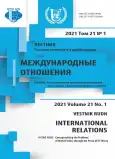Political Economy of Cross-Strait Relations
- Authors: Nakhatakyan E.O.1
-
Affiliations:
- MGIMO University
- Issue: Vol 21, No 1 (2021): Conceptualizing the Problems of World Politics through the Prism of IR Theory
- Pages: 136-147
- Section: INTERNATIONAL ECONOMIC RELATIONS
- URL: https://journal-vniispk.ru/2313-0660/article/view/320335
- DOI: https://doi.org/10.22363/2313-0660-2021-21-1-136-147
- ID: 320335
Cite item
Full Text
Abstract
The article provides a comprehensive analysis of the interrelation of political and economic factors in Cross-Strait relations. The main political factor considered in the study is the policy of the ruling party in Taiwan towards the Mainland, its acceptance of Beijing’s “One China” policy and “1992 Consensus”, put forward by Mainland China as a political basis for building Cross-Strait dialogue between the parties. Key economic factors include economic cooperation and exchanges between the two sides in such fields as bilateral trade, international capital flows and tourism. The relevance of the study refers to the settlement of the so-called Taiwan issue and the implementation of the complete reunification of the People’s Republic of China that embodies one of the fundamental interests of Mainland China. The aim of the research is to examine the impact of political cycle in Taiwan on the economic cooperation between Beijing and Taipei, the further intensification of which could lead to the peaceful reunification through economic integration. The study provides a broad overview of the development of relations between Taiwan and Mainland China, focusing on the policies of the Taipei administrations from 1949 to 2019 and its impact on economic cooperation between the two sides. The methodological framework of the paper is mainly based on international political economy. The results of the research suggest that political cycle in Taiwan has almost no impact on Cross-Strait trade and investment. Meanwhile it has quite significant influence on Cross-Strait tourism, especially from the PRC, as it has the administrative means of regulation of the number of Mainland tourists wishing to visit Taiwan.
About the authors
Ekaterina Oganesovna Nakhatakyan
MGIMO University
Author for correspondence.
Email: nakhatakyan.e.o@my.mgimo.ru
Master in Economics, Postgraduate (applicant), Department of Oriental Studies
Moscow, Russian FederationReferences
- Cabestan, J.-P., & deLisle, J. (Eds.). (2014). Political Changes in Taiwan under Ma Ying-jeou: Partisan Conflict, Policy Choices, External Constraints and Security Challenges. New York: Routledge
- Chien-min, C. (2003). One Step Forward, One Step Backward: Chen Shui-bian’s Mainland Policy. Journal of Contemporary China, 12(34), 125-143. doi: 10.1080/10670560305460
- Churchman, K. (2016). Cross-Strait Relations in the Era of Tsai Ing-wen: Shelving Differences and Seeking Common Ground? Center for the National Interest. October. URL: https://cftni.org/wp-content/uploads/2016/ 10/Churchman_Official-1.pdf (accessed: 13.02.2020)
- Dagdag, E. (2005). Chen Shui-Bian and Taiwan-China (Cross-Strait) Relations: An Initial Assessment. Asian Studies, 2005, (39), 64-85. URL: https://www.asj.upd.edu.ph/mediabox/archive/ASJ-39-1-2-2003/dagdag.pdf (accessed: 12.05.2019)
- Edmonds, R.L., & Goldstein, S.M. (2001). Taiwan in the 20th Century: An Introduction. The China Quarterly, (165), 210-223. doi: 10.1017/S0009443901000006
- Fell, D. (2012). Government and Politics in Taiwan. New York: Routledge
- Fukuda, M. (2018). The Current Situation and Prospects for Taiwan under the Tsai Ing-wen Administration. Washington, D.C.: HOSEI University
- Fuller, D.B. (2014). ECFA’s Empty Promise and Hollow Threat. In J.-P. Cabestan & J. deLisle (Eds.), Political Changes in Taiwan under Ma Ying-jeou: Partisan Conflict, Policy Choices, External Constraints and Security Challenges. New York: Routledge (pp. 85-99)
- Jacobs, J.B., & I-hao, B.L. (2007). Lee Teng-hui and the Idea of “Taiwan”. The China Quarterly, (190), 375-393. doi: 10.1017/S0305741007001245
- Lin, G. (2019). Taiwan’s Party Politics and Cross-Strait Relations in Evolution (2008-2018). Singapore: Palgrave Macmillan
- Lin, W. (2012). Taiwan in Ma’s Second Term: International Implications. Agora Asia-Europe, 2012, (9), 1-6
- Lychagin, A.I., & Komarov, I.D. (2017). The Taiwan Question: External and Internal Determinants. Vestnik RUDN. International Relations, 17(3), 530-538. (In Russian). doi: 10.22363/2313-0660-2017-17-3-530-538
- Matsuda, Y. (2015). Cross-Strait Relations under the Ma Ying-jeou Administration: From Economic to Political Dependence? Journal of Contemporary East Asia Studies, 4(2), 3-35. doi: 10.1080/24761028.2015. 11869083
- Min-hua, C. (2015). China-Taiwan Rapprochement: The Political Economy of Cross-Straits Relations. Routledge
- Muyard, F. (2010). Mid-Term Analysis of the Ma Ying-jeou Administration. China Perspectives, (3), 5-20. doi: 10.4000/chinaperspectives.5299
- Shaocheng, T. (2009). Relations across the Taiwan Strait: A New Era. Institute of International Relations, (21), 248-262. URL: https://www.ucm.es/data/cont/media/www/pag-72507/UNISCI%20DP%2021%20-%20 TANG.pdf (accessed: 12.08.2019)
- Tsai, C. (2017). The Nature and Trend of Taiwanese Investment in China (1991-2014). In L. Dittmer (Eds.), Taiwan and China: Fitful Embrace. University of California Press (pp. 133-150)
- Tsai, T., & Tony, T.L. (2017). Cross-Strait Relations and Regional Integration: A Review of Ma Ying-jeou Era (2008-2016). Journal of Current Chinese Affairs, 46(1), 11-35
- Wei-Cheng Wang, V. (2002). The Chen Shui-Bian Administrations Mainland Policy: Toward a Modus Vivendi or Continued Stalemate? American Asian Review, 20(3), 91-124. URL: https://digitalcommons.ithaca.edu/cgi/ viewcontent.cgi?article=1016&context=politics_faculty_pubs (accessed: 10.09.2019)
- Yitan, L., & Enyu, Zh. (2016). Cross-Strait Relations after the 2016 Taiwan Presidential Election: The Impact of Changing Taiwanese Identity. Seattle University. P. 1-24. URL: http://www.wpsanet.org/papers/docs/ WPSA2016%20Li%20and%20Zhang.pdf (accessed: 08.08.2019)
- Yi-Wen, Y., Ko-Chia, Y., & Tse-Chun, L. (2016). Political Economy of Cross-Strait Relations: Is Beijing’s Patronage Policy on Taiwanese Business Sustainable? Journal of Contemporary China, 25(99), 1-17. doi: 10.1080/10670564.2015.1104871
Supplementary files









